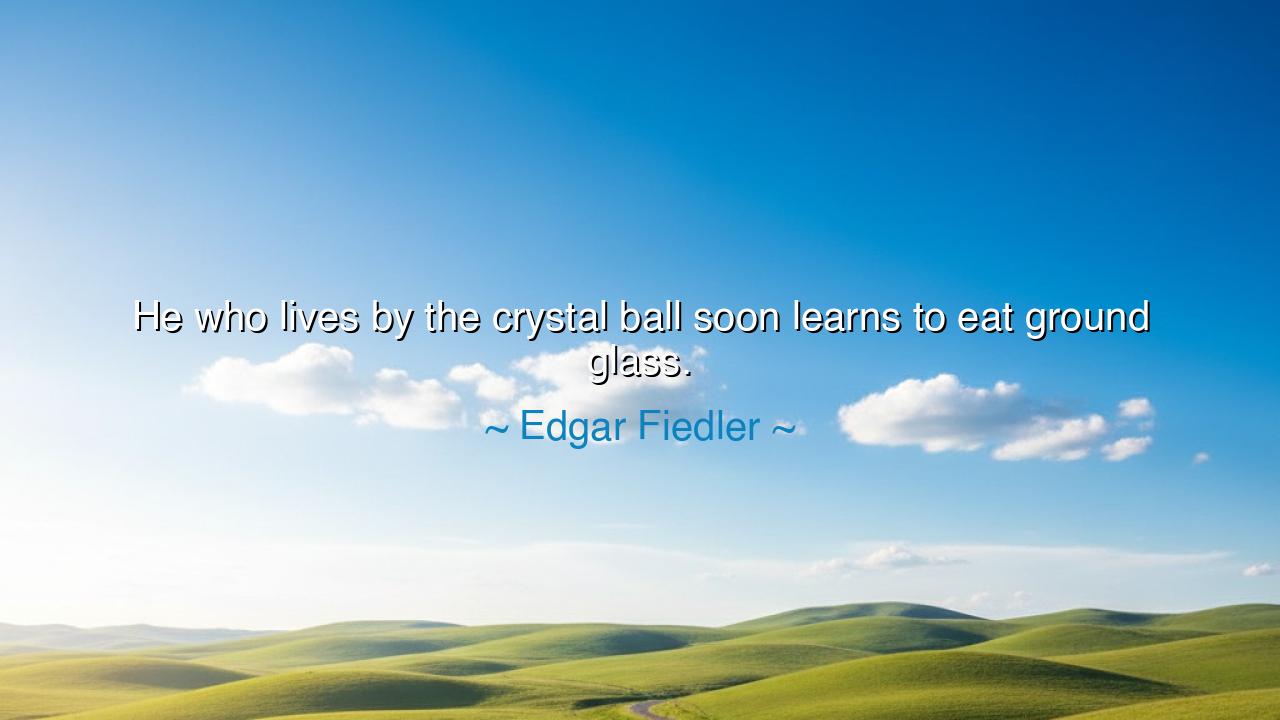
He who lives by the crystal ball soon learns to eat ground






O Seekers of Truth and Discernment, hear the words of Edgar Fiedler, who warns us of the dangers of relying on the unknown: "He who lives by the crystal ball soon learns to eat ground glass." In this vivid declaration, Fiedler speaks to the peril of relying on predictions, assumptions, and speculative visions of the future without grounding them in the harsh realities of the present. The crystal ball, that mystical symbol of fortune-telling, promises certainty, but it is an illusion. Those who seek to navigate life by staring into such false oracles often find themselves confronted by the sharp, painful truth that their expectations were built on fragile foundations.
Consider, O Children, the nature of foresight. While it is wise to plan and to envision the future, it is folly to believe that we can predict every turn of fate. Life is unpredictable, and no amount of speculation or reliance on the crystal ball will shield us from its uncertainties. The wise do not cling to false promises of certainty but build their lives on the solid ground of experience, action, and the acceptance of life’s inherent unpredictability. To rely solely on the imaginary, without the strength of reality, is to invite disappointment and suffering.
Look to the example of the stock market crash of 1929, when many believed that wealth and success were certain, based on trends and predictions that seemed unstoppable. Speculators, relying on the promise of ever-increasing returns, lived by their metaphorical crystal ball, convinced that the good times would never end. But when the crash came, it was as if they had been fed ground glass, a bitter and painful truth that shattered their illusions and left many in ruin. In their blindness to the reality of risk and uncertainty, they learned too late that the future cannot be controlled or predicted with certainty.
And so, O Seekers, let us understand the danger of the crystal ball—that alluring temptation to shape our lives based on uncertain guesses and hopes for the future. Fiedler teaches us that true wisdom lies in accepting the unknown, in acting with courage in the present, and in embracing the uncertainties of life with grace. The future will always be a mystery, and those who try to grasp it too tightly often end up hurt when it slips away, like ground glass in their hands.
Let us, therefore, build our lives not on the shaky ground of predictions, but on the firm foundation of action, integrity, and pragmatism. We must plan, yes, but with the understanding that the future is fluid, and we cannot control all its twists and turns. By facing life as it is, without relying on false hopes or predictions, we will find the strength to navigate its challenges and emerge wiser, stronger, and free from the painful illusion of certainty.






THBui Thi Hoa
There’s an ethical dimension around public experts. If someone’s livelihood depends on bold predictions, incentives encourage catchy certainty over careful nuance. Should media outlets require a track record page with scored forecasts, not just opinions? Could we normalize prediction markets, transparent resolution criteria, and humility—“my 60% was wrong; here’s why”—as a condition of airtime? I’m asking for standards: disclosure of conflicts, probabilistic framing, and mandatory audits. Without accountability, we risk turning guidance into performance art that misleads audiences and policymakers.
TNDuong Trang Nhung
In risk management, the lesson seems to be: distinguish planning from prophecy. I’d like a playbook that emphasizes ranges, not point estimates; scenarios with triggers; and pre-committed hedges. For example, define three plausible futures, attach leading indicators, and wire automatic responses—position sizing, budget gates, contingency staffing—so judgment isn’t paralyzed when surprises hit. What lightweight tools work best for this—decision logs, value-of-information calculations, or threshold alerts? And how do we teach teams to update beliefs quickly without whipsawing strategy every other week?
Kkamehamehahaha
Psychologically, this feels like a caution against outsourcing comfort to imagined futures. I notice in myself a loop: anxiety → compulsive scenario-spinning → temporary relief → deeper anxiety when reality refuses to match. How do we nudge attention back to present evidence while still planning responsibly? Any daily practice you recommend—perhaps a short uncertainty journal, a mindfulness check before big calls, or a “satisficing” threshold to stop the endless search for perfect foresight? I want realism that soothes, not speculation that spirals.
KVKhoa vu
From a product manager’s seat, I’ve watched roadmaps harden around optimistic projections, then morale nosedive when reality intrudes. How do we keep plans flexible without sliding into chaos? I’m considering a quarterly ritual: pre-mortem the biggest bet, set reversible checkpoints, and define a “kill or pivot” metric before we fall in love. What success indicators should be leading rather than lagging—activation proxies, cycle time, cost of delay? And what’s the right cadence to re-forecast without thrashing engineers or stakeholders?
ZZAP
As a data-minded reader, I hear a warning about getting addicted to predictions. Do we measure forecasters with calibration plots and Brier scores, or just reward confident narratives? I’m curious how often teams actually retire a forecasting model when it underperforms versus rationalizing it with new parameters. Should anyone offering a probability also publish their base rates, confidence intervals, and a postmortem schedule? I’d love a simple rubric for “forecast hygiene”: record the claim, timestamp it, assign odds, track outcomes, and face the music publicly.